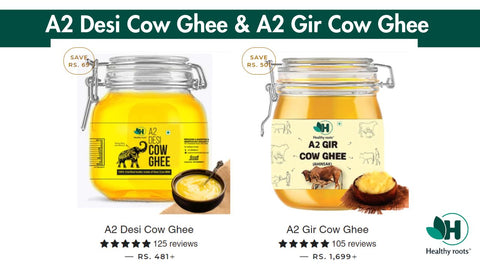Are you also in a dilemma about which ghee you should prefer? Cow ghee vs buffalo ghee? If yes, this blog is just for you.
Ghee, made from either cow milk or buffalo milk, is revered not only for its culinary properties but also for its role in Ayurvedic medicine. It takes your culinary dishes to a new height. It is a storehouse of nutrients that have the power to strengthen the body from both inside and outside. From boosting cognitive function to offering better sleep, relieving joint pains, and promoting glowing skin, ghee works like magic. Let’s explore what sets cow ghee apart from buffalo ghee.
Difference Between Buffalo Ghee and Cow Ghee
| Aspect | Cow Ghee | Buffalo Ghee |
| Shelf Life | Typically lasts for about 3-6 months due to oxidation. | Can last up to a year due to higher fat content. |
| Weight Management | Generally contains fewer calories, aiding in weight management. | Higher in calories, which may contribute to weight gain. |
| Color | Has a rich yellow hue because of the higher carotene content. | Tends to be white or off-white as it lacks carotene. |
| Digestion | Lighter, making it easier to digest and suitable for people with digestive issues. | Heavier consistency can be harder to digest. |
| Nutrients | A good source of vitamin A, E, and D with about 7-8% saturated fats. | Rich in minerals like calcium (up to 8% more) and magnesium. |
| Milk to Ghee Ratio | Requires about 25-30 liters of milk to produce 1 kilogram of ghee. | More efficient, needing only 18-22 liters for 1 kilogram of ghee. |
| Cooking | Offers a subtle flavor, preferred for not overpowering dishes. | Its strong aroma and flavor can enhance the taste of food. |
| Skin Benefits | Its anti-inflammatory properties are beneficial for skin care routines. | Acts as a hydrating agent, ideal for dry skin conditions. |
| Composition | Contains antioxidants and conjugated linoleic acid (CLA), which can be about 5% of its fat content. | Similar fatty acid profile but with a higher fat content, often up to 82%. |
| Dairy Products | Often used in the production of sweets and as a topping for foods due to its pleasant aroma. | Commonly used in making richer dairy products like ice cream and cheese. |
| Elderly Consumption | Recommended for seniors due to its potential in lowering bad cholesterol levels. | Less recommended for the elderly due to its density and high fat content. |
| Ayurvedic Use | Extensively used in Ayurveda for its therapeutic properties. | Used less in Ayurveda but is still valued for its nutritional benefits. |
1. Source
Cow ghee is derived from cow’s milk, having a sweet aroma & taste. On the other hand, buffalo ghee is sourced from buffalo milk, which boasts a nuttier flavor profile.
2. Nutritional Content
Cow ghee contains a higher number of nutrients, including minerals, vitamins, proteins, and antioxidants. Buffalo ghee, on the other hand, has a higher amount of fat and calories.
3. Taste & Aroma
Cow ghee tends to have a gentle, slightly sweet flavor and smell, while buffalo ghee has a richer, more exquisite flavor and aroma.
4. Color
One of the most visible differences between cow ghee and buffalo ghee is their color. Cow ghee is yellow golden, whereas buffalo ghee is white or off white.
5. Shelf life
The shelf life of ghee is influenced by several factors, including its production method, storage conditions, and purity. Researchers suggest that buffalo ghee, owing to its higher fat content, typically boasts a longer shelf life compared to cow ghee.
Also Read - Cow Ghee Benefits as per Ayurveda
Which Works Great in Weight Management?
If you wish to lose weight, opt for cow ghee, as it has fewer calories compared to buffalo ghee. Additionally, cow ghee is known to have anti-inflammatory properties, which can aid digestion.
It is also a better source of conjugated linoleic acid, which can assist in weight loss. Consume buffalo ghee when you are underweight, as its milk contains more calories and fat.
Which is Best for Culinary Purposes?
Their high smoke points make them perfect for sauteing and stir frying. However, the aroma and unique flavor element may vary. Cow ghee has a more neutral taste, whereas buffalo ghee has a particular flavour that many food enthusiasts love.
Which Ghee is Best for Elderly People - Buffalo Ghee vs Cow Ghee?
Cow ghee may be preferred by elderly people due to its milder flavor and lower fat content, making it easier to digest. However, buffalo ghee's higher fat content can be valuable for those requiring extra calories or battling with weight support.
Which Ghee is More Preferred in Ayurveda- cow ghee or buffalo ghee?
According to Ayurveda, cow ghee has more therapeutic properties and is compatible with the body's constitution. It is light in nature and has the ability to balance the body's doshas.

